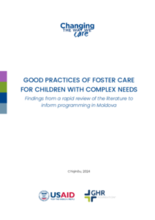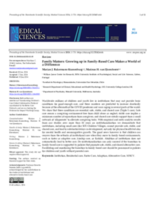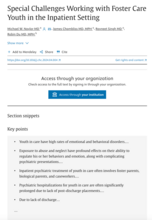Displaying 41 - 50 of 2221
Bune Practici de Asistență Parentală Profesionistă pentru Copiii cu Nevoi Complexe: Rezultatele analizei preliminare a literaturii de specialitate pentru pregătirea proiectului pilot privind asistența parentală profesionistă specializată în Republica Moldova rezumă cele mai bune practici internaționale în domeniul asistenței parentale profesioniste specializate, și oferă perspective și recomandări esențiale pentru dezvoltarea și extinderea asistenței parentale profesioniste specializate în Republica Moldova.
This report summarizes international best practices of specialized foster care and provides critical insights and recommendations for developing and scaling specialized foster care in Moldova.
This study aimed to analyze the narratives of social educators regarding their practices within a foster care institution for children and adolescents in South Brazil.
This U.S.-based study aimed to get recommendations from stakeholders with lived and/or professional experience in foster care to understand how to increase participation in research and how to capture a broader representation of those impacted.
This qualitative study of cluster foster parents in Mpumalanga, South Africa, revealed that they are faced with extreme challenges such as lack of support, knowledge, and limitation of resources in fostering children with special needs.
This article explores the journey of foster care in India from 2010 to 2024 as an analysis and commentary on the substantive changes between the foster care 2016 model guidelines and the newly released foster care 2024 guidelines.
This article reviews a study conducted about child development in residential care, foster/kafalah care, and adoptive families. The authors of the study demonstrated that institutions cannot provide safe, stable, and shared care for children, and lead to substantial delays in their development, not only for physical health but also for mental health and neurocognitive growth.
The aim of this empirical study was to analyse the relevance of long-term care solutions implemented in Poland for children leaving foster care, from the perspective of professional caregivers of the process of becoming independent.
This article details the authors' findings that provide the first description of foster care trajectories in the US. Both practice and policy formulation can benefit from these empirically supported descriptions. Using such trajectory typologies, researchers can now explore how trajectories may predict wellbeing outcomes.
This article details to unique challenges faced by youth in care in the US when receiving inpatient treatment and how that varies in several ways from the care of non-foster care youth. Children in care have more medical, behavioral, and psychiatric problems and require health care at higher rates than youth not engaged in the child welfare system.










